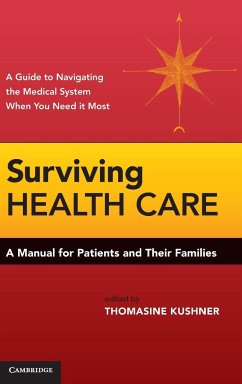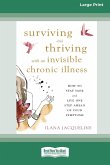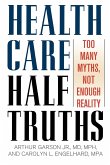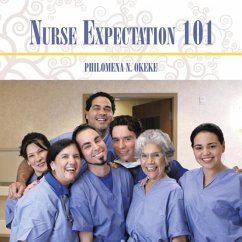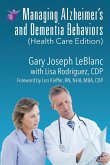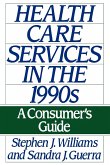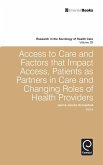Surviving Health Care
Herausgeber: Kushner, Thomasine
Surviving Health Care
Herausgeber: Kushner, Thomasine
- Gebundenes Buch
- Merkliste
- Auf die Merkliste
- Bewerten Bewerten
- Teilen
- Produkt teilen
- Produkterinnerung
- Produkterinnerung
This book is a tool to help patients and families deal rationally with the perplexing and often irrational world of healthcare.
Andere Kunden interessierten sich auch für
![Surviving and Thriving with an Invisible Chronic Illness Surviving and Thriving with an Invisible Chronic Illness]() Ilana JacquelineSurviving and Thriving with an Invisible Chronic Illness26,99 €
Ilana JacquelineSurviving and Thriving with an Invisible Chronic Illness26,99 €![Health Care Half-Truths Health Care Half-Truths]() Arthur GarsonHealth Care Half-Truths26,99 €
Arthur GarsonHealth Care Half-Truths26,99 €![Nurse Expectation 101 Nurse Expectation 101]() Philomena N. OkekeNurse Expectation 10123,99 €
Philomena N. OkekeNurse Expectation 10123,99 €![Managing Alzheimer's and Dementia Behaviors (Health Care Edition) Managing Alzheimer's and Dementia Behaviors (Health Care Edition)]() Gary Joseph LeblancManaging Alzheimer's and Dementia Behaviors (Health Care Edition)21,99 €
Gary Joseph LeblancManaging Alzheimer's and Dementia Behaviors (Health Care Edition)21,99 €![Health Care Services in the 1990s Health Care Services in the 1990s]() Stephen Joseph WilliamsHealth Care Services in the 1990s52,99 €
Stephen Joseph WilliamsHealth Care Services in the 1990s52,99 €![Health Care Reform and Disparities Health Care Reform and Disparities]() Toni MilesHealth Care Reform and Disparities71,99 €
Toni MilesHealth Care Reform and Disparities71,99 €![Access To Care and Factors That Impact Access, Patients as Partners In Care and Changing Roles of Health Providers Access To Care and Factors That Impact Access, Patients as Partners In Care and Changing Roles of Health Providers]() Access To Care and Factors That Impact Access, Patients as Partners In Care and Changing Roles of Health Providers212,99 €
Access To Care and Factors That Impact Access, Patients as Partners In Care and Changing Roles of Health Providers212,99 €-
-
This book is a tool to help patients and families deal rationally with the perplexing and often irrational world of healthcare.
Hinweis: Dieser Artikel kann nur an eine deutsche Lieferadresse ausgeliefert werden.
Hinweis: Dieser Artikel kann nur an eine deutsche Lieferadresse ausgeliefert werden.
Produktdetails
- Produktdetails
- Verlag: Cambridge University Press
- Seitenzahl: 338
- Erscheinungstermin: 3. Juni 2010
- Englisch
- Abmessung: 235mm x 157mm x 24mm
- Gewicht: 700g
- ISBN-13: 9780521767965
- ISBN-10: 0521767962
- Artikelnr.: 28177573
- Herstellerkennzeichnung
- Libri GmbH
- Europaallee 1
- 36244 Bad Hersfeld
- gpsr@libri.de
- Verlag: Cambridge University Press
- Seitenzahl: 338
- Erscheinungstermin: 3. Juni 2010
- Englisch
- Abmessung: 235mm x 157mm x 24mm
- Gewicht: 700g
- ISBN-13: 9780521767965
- ISBN-10: 0521767962
- Artikelnr.: 28177573
- Herstellerkennzeichnung
- Libri GmbH
- Europaallee 1
- 36244 Bad Hersfeld
- gpsr@libri.de
1. Letter to patients: on becoming the 'good' patient and finding the 'right' doctor Leonard Groopman
2. Becoming an active member of your healthcare team William Norcross
3. Information that will help you with advance planning for your health care Mark Wicclair
4. What do you do now? Responding to medical emergencies Kenneth V. Iserson
5. What you need to know about medical errors Erica Friedman and Rosamond Rhodes
6. Being informed when you give consent to medical care Ben Rich
7. Beware of scorecards Rosamond Rhodes and James Strain
8. Transplantation 101: negotiating the system Aaron Spital and Steven Smith
9. When the illness is psychiatric Leonard Groopman
10. On the horizon: genetic testing Robyn Shapiro
11. To be or not to be - a research subject? Eric Meslin and Peter Schwartz
12. Information that will help you make health care decisions for adult family members Mark Wicclair
13. Caring for individuals with Alzheimer's Robyn Shapiro
14. When the patient is a child Timothy Yeh
15. Care of elders Claudia Landau and Guy Micco
16. Being and thinking Hina Singh, Claudia Jacova, Paul Ford, and Judy Illes
17. Your guide to pain management Ben Rich
18. The hardest decisions: when treatment stops working Timothy Quill and Mindy Shah
19. What you need to know about disasters Griffin Trotter
20. Making the internet work for you: researching your health questions Bette Anton.
2. Becoming an active member of your healthcare team William Norcross
3. Information that will help you with advance planning for your health care Mark Wicclair
4. What do you do now? Responding to medical emergencies Kenneth V. Iserson
5. What you need to know about medical errors Erica Friedman and Rosamond Rhodes
6. Being informed when you give consent to medical care Ben Rich
7. Beware of scorecards Rosamond Rhodes and James Strain
8. Transplantation 101: negotiating the system Aaron Spital and Steven Smith
9. When the illness is psychiatric Leonard Groopman
10. On the horizon: genetic testing Robyn Shapiro
11. To be or not to be - a research subject? Eric Meslin and Peter Schwartz
12. Information that will help you make health care decisions for adult family members Mark Wicclair
13. Caring for individuals with Alzheimer's Robyn Shapiro
14. When the patient is a child Timothy Yeh
15. Care of elders Claudia Landau and Guy Micco
16. Being and thinking Hina Singh, Claudia Jacova, Paul Ford, and Judy Illes
17. Your guide to pain management Ben Rich
18. The hardest decisions: when treatment stops working Timothy Quill and Mindy Shah
19. What you need to know about disasters Griffin Trotter
20. Making the internet work for you: researching your health questions Bette Anton.
1. Letter to patients: on becoming the 'good' patient and finding the 'right' doctor Leonard Groopman
2. Becoming an active member of your healthcare team William Norcross
3. Information that will help you with advance planning for your health care Mark Wicclair
4. What do you do now? Responding to medical emergencies Kenneth V. Iserson
5. What you need to know about medical errors Erica Friedman and Rosamond Rhodes
6. Being informed when you give consent to medical care Ben Rich
7. Beware of scorecards Rosamond Rhodes and James Strain
8. Transplantation 101: negotiating the system Aaron Spital and Steven Smith
9. When the illness is psychiatric Leonard Groopman
10. On the horizon: genetic testing Robyn Shapiro
11. To be or not to be - a research subject? Eric Meslin and Peter Schwartz
12. Information that will help you make health care decisions for adult family members Mark Wicclair
13. Caring for individuals with Alzheimer's Robyn Shapiro
14. When the patient is a child Timothy Yeh
15. Care of elders Claudia Landau and Guy Micco
16. Being and thinking Hina Singh, Claudia Jacova, Paul Ford, and Judy Illes
17. Your guide to pain management Ben Rich
18. The hardest decisions: when treatment stops working Timothy Quill and Mindy Shah
19. What you need to know about disasters Griffin Trotter
20. Making the internet work for you: researching your health questions Bette Anton.
2. Becoming an active member of your healthcare team William Norcross
3. Information that will help you with advance planning for your health care Mark Wicclair
4. What do you do now? Responding to medical emergencies Kenneth V. Iserson
5. What you need to know about medical errors Erica Friedman and Rosamond Rhodes
6. Being informed when you give consent to medical care Ben Rich
7. Beware of scorecards Rosamond Rhodes and James Strain
8. Transplantation 101: negotiating the system Aaron Spital and Steven Smith
9. When the illness is psychiatric Leonard Groopman
10. On the horizon: genetic testing Robyn Shapiro
11. To be or not to be - a research subject? Eric Meslin and Peter Schwartz
12. Information that will help you make health care decisions for adult family members Mark Wicclair
13. Caring for individuals with Alzheimer's Robyn Shapiro
14. When the patient is a child Timothy Yeh
15. Care of elders Claudia Landau and Guy Micco
16. Being and thinking Hina Singh, Claudia Jacova, Paul Ford, and Judy Illes
17. Your guide to pain management Ben Rich
18. The hardest decisions: when treatment stops working Timothy Quill and Mindy Shah
19. What you need to know about disasters Griffin Trotter
20. Making the internet work for you: researching your health questions Bette Anton.

